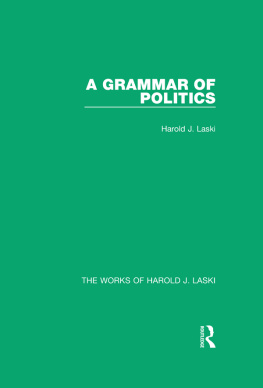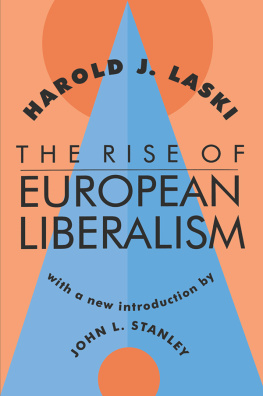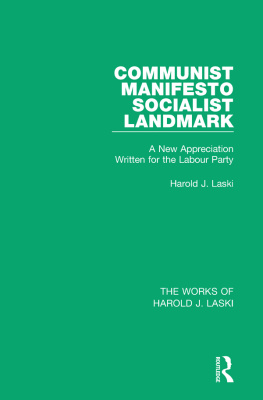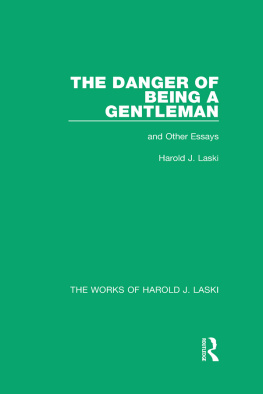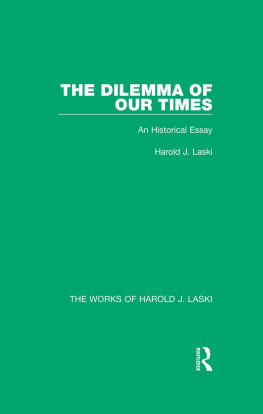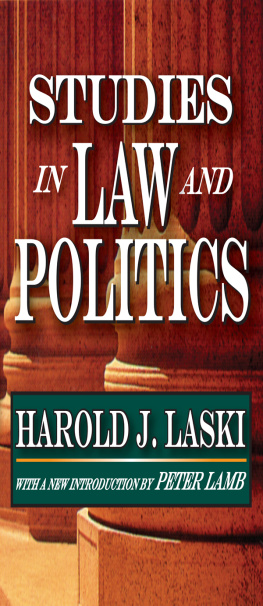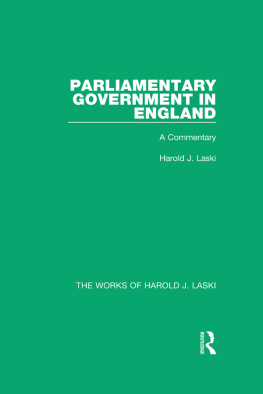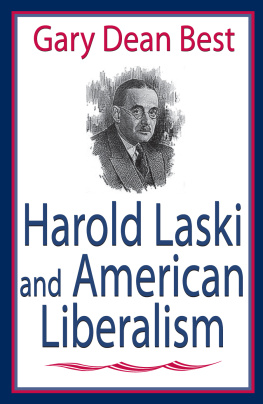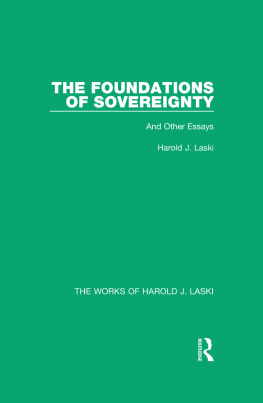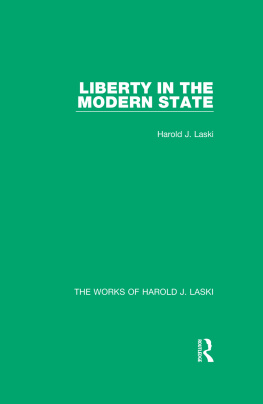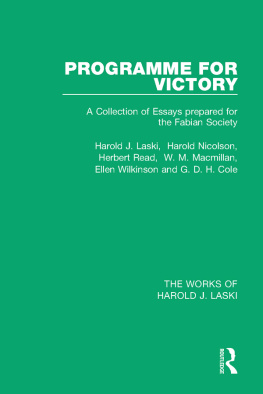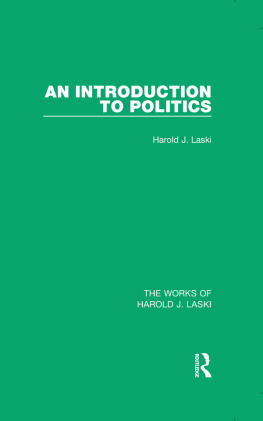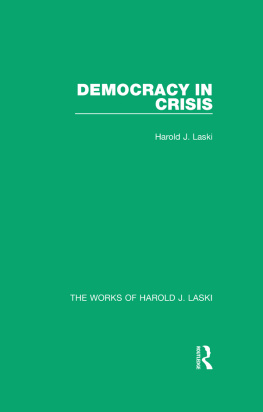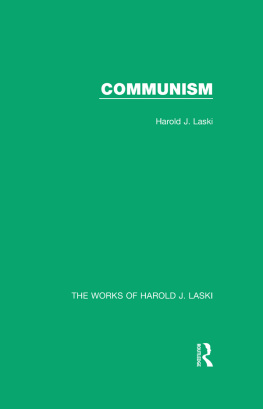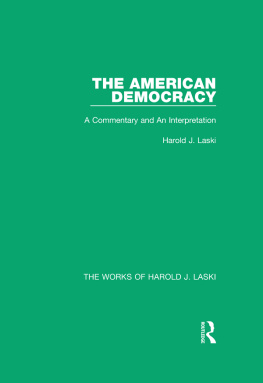THE WORKS OF HAROLD J. LASKI
Volume 4
A GRAMMAR OF POLITICS
First published in 1925
This edition first published in 2015
by Routledge
2 Park Square, Milton Park, Abingdon, Oxon, OX14 4RN
and by Routledge
711 Third Avenue, New York, NY 10017
Routledge is an imprint of the Taylor & Francis Group, an informa business
1925, 1941 George Allen & Unwin Ltd
All rights reserved. No part of this book may be reprinted or reproduced or utilised in any form or by any electronic, mechanical, or other means, now known or hereafter invented, including photocopying and recording, or in any information storage or retrieval system, without permission in writing from the publisher
Trademark notice: Product or corporate names may be trademarks or registered trademarks, and are used only for identification and explanation without intent to infringe.
British Library Cataloguing in Publication Data
A catalogue record for this book is available from the British Library
ISBN: 978-1-138-81912-2 (Set)
eISBN: 978-1-315-74273-1 (Set)
ISBN: 978-1-138-82192-7 (Volume 4)
eISBN: 978-1-315-74265-6 (Volume 4)
Publishers Note
The publisher has gone to great lengths to ensure the quality of this reprint but points out that some imperfections in the original copies may be apparent.
Disclaimer
The publisher has made every effort to trace copyright holders and would welcome correspondence from those they have been unable to trace.
First published, June 1925
Second Impression, January 1926
Third Impression, February 1928
Second Edition (Fourth Impression), January 1930
Fifth Impression (Second Edition), April 1931
Third Edition (Sixth Impression), June 1934
Fourth Edition (Seventh Impression), February 1938
Fourth Edition (Eighth Impression), December 1941
Printed in Great Britain by
Billing and Sons Ltd., Guildford and Esher
[F4 24]
TO
THE LONDON SCHOOL OF ECONOMICS AND POLITICAL SCIENCE
AND TO
SIDNEY AND BEATRICE WEBB,
ITS FOUNDERS
For freedom, we know, is a thing that we have to conquer afresh for ourselves, every day, like love; and we are always losing freedom, just as we are always losing love, because, after eacb victory, we think we can now settle down and enjoy it without further struggle. The battle of freedom is never done, and the field never quiet.
HENRY W. NEVINSON,
Essays in Freedom, p. xvi.
The great question is to discover, not what governments prescribe, but what they ought to prescribe; for no prescription is valid against the conscience of mankind.
LORD ACTON,
History of Freedom, p. 24.
PREFACE TO THE FOURTH EDITION
(Seventh Impression)
I HAVE taken advantage of a reprint of this book to add a new introductory chapter which seeks to survey developments in doctrine since 1925. Otherwise the book remains unchanged.
H. J. L.
November 1, 1937.
PREFACE TO THE THIRD EDITION
(Sixth Impression)
In the nine years that have passed since the publication of this book little has occurred which seems to me to call for any change in its essential doctrine. Indeed, time has, I think, reinforced rather than diminished the truth of the central principles it sought to lay down. The necessarily federal character of society; the incompatibility of the sovereign State with that economic world-order so painfully struggling to be born; the antithesis between individual property rights in the essential means of production and the fulfilment of the democratic idea; the thesis that liberty is a concept devoid of real meaning except in the context of equality; the refusal to regard law as valid merely in terms of the formal authority from which it emanates; the argument that in any society, even when based on equal and universal suffrage, the existence of serious economic inequalities biases the incidence of government in favour of the rich; all these seem to me to have received explicit confirmation from the events of the last decade.
For the interpretation of this period is bound to proceed upon two assumptions. (r) It is clear that Fascism, in its various national forms, is simply the expedient adopted by capitalism in distress to defeat the democratic political foundation with which it could be successfully linked in its period of creative expansion. Democratic institutions are, as Tocqueville insisted a century ago, inseparably associated with the drive towards economic equality; and when, as now, that drive encounters an epoch of economic decline, the democratic institutions are attacked in order that the owners of property may be safeguarded against the consequences of their operation. Only in this way can we explain the widespread attack on principles like freedom of speech, due process in political offences, (so remarkably illustrated by Hitlerite legislation and activities), and the grave attack on the right of labour to strike. Wherever the movement of democratic opinion seeks to revise the traditional foundations of economic individualism, the owners of property seek to change the system which makes that movement possible. The survival of political democracy today is, all over the world, definitely impossible unless it can conquer the central citadel of economic power. There cannot, in a word, be democracy unless there is socialism. That does not mean the necessary victory of democracy. Its expansion in the nineteenth century into a world-ideal now appears, in the perspective of post-war events, to have been simply a function of capitalism in prosperity; with the eclipse of capitalism it is not improbable that civilisation may have to pass through an age of dictatorships which, whatever their formal professions, will, in fact, simply seek to inhibit the emergence of egalitarian institutions for the benefit of the invested interests.
(2) It is clear, also, that capitalism in distress makes impossible the effective operation of international institutions; it is, therefore, fatal to the creative functioning of the League of Nations. For capitalism (though in many aspects itsdf international) is organised on a national basis; and, since this is the case, the owners of capital in each national community utilise the framework of State power for their protection. Since capitalism forces them to press ever more strongly to tl^e capture of foreign markets the State largely becomes for them a means of protecting and extending their investments abroad. The outcome of this tendency is the clash of competing economic imperialisms which arm themselves to the teeth to secure their gains. Fear, suspicion and hatred are born of this atmosphere; the sovereign State will not, in these terms, be persuaded to submit its will to a power outside itself. That is what is meant by failures like that of the World Economic Conference in 1933 and the Disarmament Conference in 1934. The interest of the world community has to give way before the interests of powerful States protecting their national capitalists in some special advantage they propose either to maintain or secure. This is the history, lor example, of the Japanese adventure in Manchuria; Japan has preferred to sacrifice the hope of peace and iriternational security to the imperial ambitions of her governing class. Capitalism, in a word, is rooted in a system which makes power the criterion of right and war the ultimate expression of power. No reconciliation is possible between its necessary policies and the idea of a world-community founded upon the sovereign States surrender of its right to be judge in its own cause.

